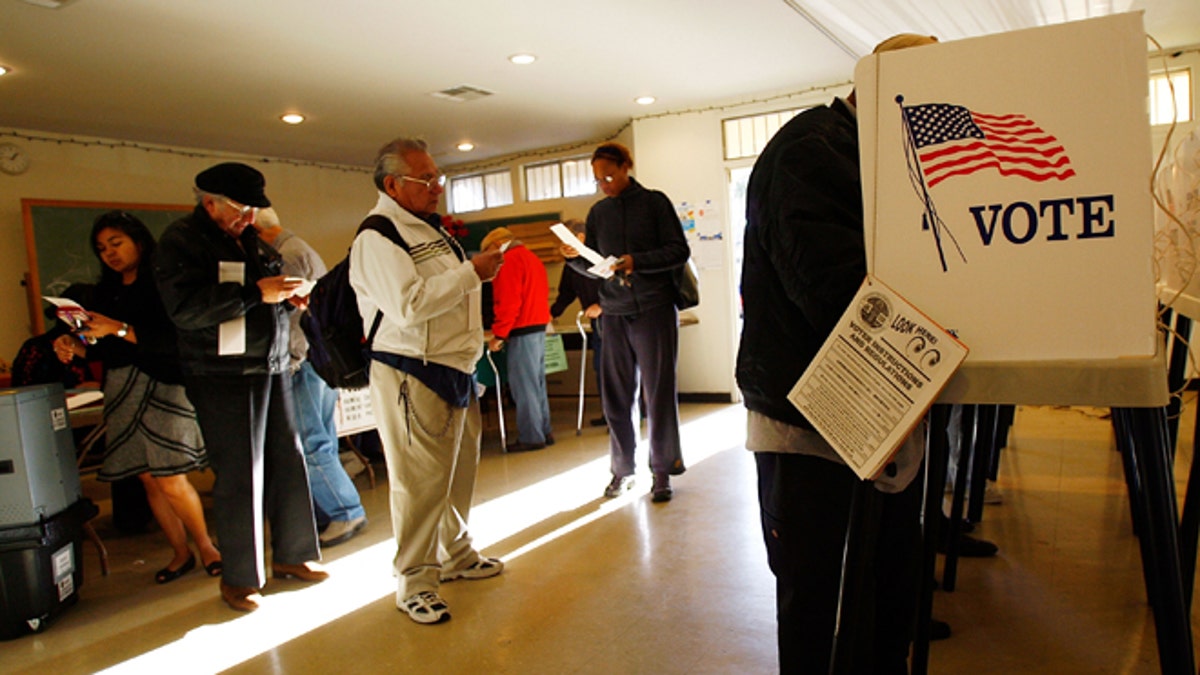
LOS ANGELES, CA - FEBRUARY 05: Voters go to the polls for Super Tuesday primaries in the predominantly Latino neighborhood of Boyle Heights on February 5, 2008 in Los Angeles, California. Latinos are an increasingly important factor in California where they are expected to account for 14 percent of the vote and tend to favor presidential hopeful Sen. Hillary Clinton (D-NY) over rival Sen. Barack Obama (D-IL). At 44 million, Latinos make up15 percent of the US population, the nation's largest minority group according to the latest Census Bureau estimates. (Photo by David McNew/Getty Images) (2008 Getty Images)
Latino support for the Democratic Party is not as strong as it has been in recent elections, a national survey of Latinos conducted by the Pew Research Center released on Wednesday revealed.
While the Republicans still lag among Hispanics, the gap is narrowing. The study found that 63 percent of Latinos identify with or lean toward the Democratic Party, as opposed to 27 percent for the GOP.
That’s down from a 70 to 22 percent Democratic advantage in in 2012.
The gap is smaller when asked about voters’ plans for the Congressional midterms. Only 57 percent of registered Latino voters said that they planned to vote or were leaning Democratic, as opposed to the 28 percent who plan to vote or are leaning Republican.
That’s down from a 65-22 Democratic edge in the last midterm elections in 2010.
“Americans are tired of Democrats’ lies and broken promises from jobs to ObamaCare to immigration reform,” Republican National Committee director of Hispanic media, Ruth Guerra, told Fox News Latino. “Latino voters know their vote has been taken for granted and are looking for a change.”
But Pili Tobar, Democratic National Committee press secretary and director of Hispanic media, cautioned against reading too much into the study.
“While Republicans make it clear that they will fight administrative relief at every turn and keep refusing to vote on the bipartisan bill sitting on [House] Speaker [John] Boehner's desk,” Tobar told Fox News Latino, “Democrats are fighting for immigration reform that keeps families together."
On the matter of immigration, the Pew survey found Hispanics to be a deeply divided group.
About a third (35 percent) of Latino voters described themselves as being either “angry” or “disappointed” at President Barack Obama’s decision to delay executive action on immigration until after the election.
More than a quarter (26 percent) said they were either “pleased” or “very happy” about it.
As for who is more to blame for the lack of action on immigration, registered voters in the survey were likelier to blame Republicans in Congress (45 percent) than either the president (20 percent) or Congressional Democrats (14 percent).
And while nearly three-quarters of the survey’s respondents said that immigration is either extremely or very important to them, that placed the issue behind education (92 percent), jobs and the economy (91 percent) and health care (86 person), but ahead of the conflicts in the Middle East (66 percent).
"These elections are critical in deciding whether the composition of Congress will be conducive to policies that are in the best interest of Latinos or whether we end up with a Republican congress that continues blocking policies that would benefit the community," the DNC's Tobar said. "There’s a lot at stake on November 4th - not just the future of immigration reform and administrative relief for the community - but also issues like increasing the minimum wage, equal pay and affordable higher education.”
Another possibly surprising finding is that a majority of Latino registered voters (54 percent) said they would vote for a candidate who disagreed with them on immigration policy provided that they agreed on most other issues, as compared to 36 percent who said they wouldn’t.
“The bottom line is voters want candidates who will fight for job creation, access to better schools, and truly affordable healthcare,” Guerra told FNL. “Harry Reid’s do-nothing Senate has proved its ineffectiveness and that’s partly why we continue to see momentum on the Republican side.”
A Washington Post/ABC News poll released Wednesday also showed that Latino voters are either apathetic or in favor of the GOP taking over control of the Senate.
Thirty percent of Latino respondents thought it would be a “good thing,” compared to only 15 percent who ranked it a “bad thing.” Half thought it would make no difference. Although it should be pointed out that the small sample size involved makes the margin of error much higher than for the overall poll.
Among all respondents, the numbers were 33 percent “good thing,” 24 percent “bad thing” and 39 percent no difference.
The Post-ABC surveyed a national sample of 1,204 adults by telephone between Thursday and Sunday. The Pew Research Center poll was conducted by phone between Sept. 11 and Oct. 9 and surveyed 1,520 Latino adults, 733 of them registered voters. Its margin of error for the full sample of respondents is 3.2 percent, 4.8 percent for registered voters.









































